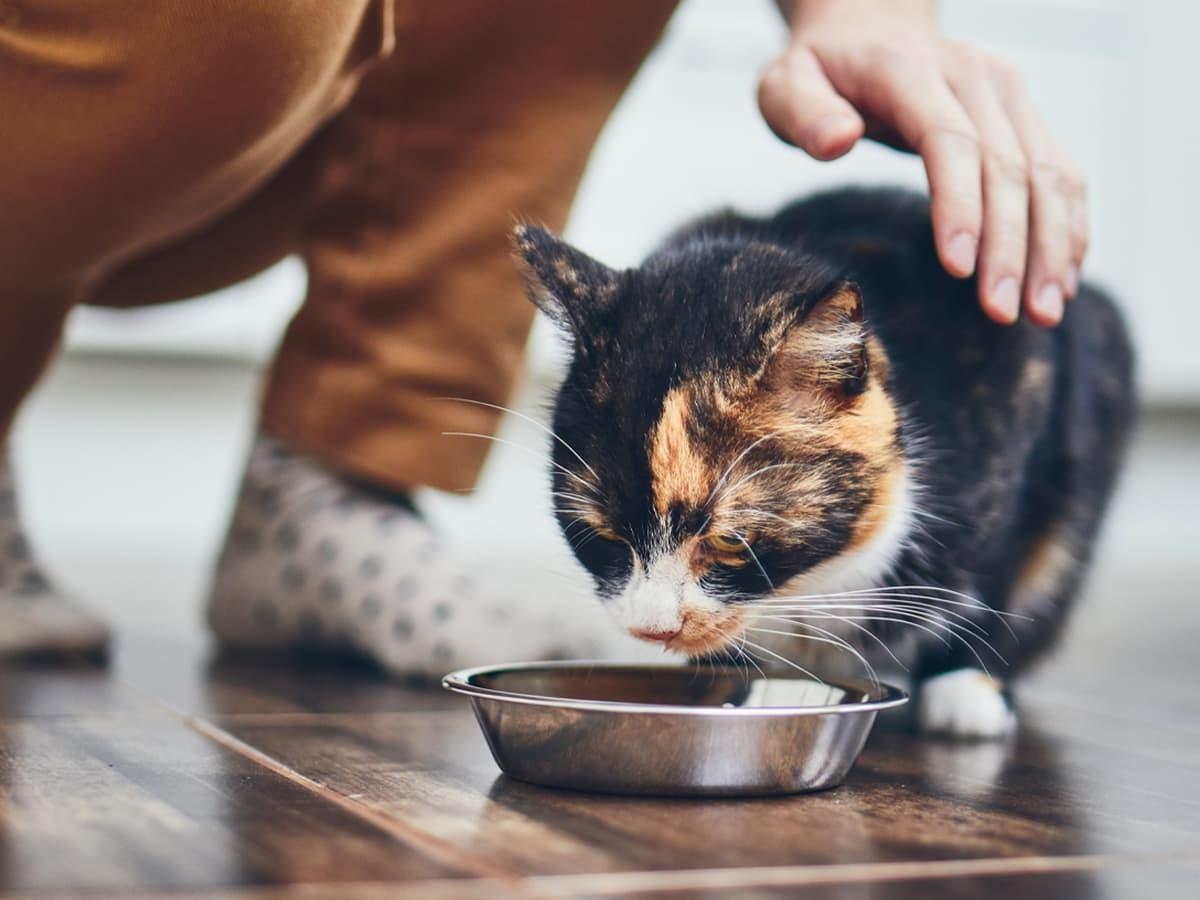A can of peanut butter opens, and a dog goes wild. It’s an all too familiar scenario, commonly referenced in pop culture. Do cats love peanut butter in the same way? How about raw peanuts?
As pet parents, it can be tempting to share our human food with our furry friends, especially when they are as curious as cats tend to be. Even though these critters are usually picky eaters, they can also be drawn to whatever we are eating.
So should we give them a bite? A core responsibility of pet owners is to inform themselves on what foods are safe and healthy (or not so much) for their animals. We are tasked with protecting our pet’s well-being, and it starts with feeding them the right things and avoiding the wrong things.
Today, we’re taking a deep dive into peanuts as a cat snack. Whether you’ve thought of sharing some trail mix, or your cat is constantly meowing as you spread peanut butter on your morning toast, we’re here to help you learn whether this snack is appropriate for your pet.
Are peanuts safe for cats? Are peanuts healthy for cats? How many peanuts can cats eat? We’re answering all those questions and more.
Understanding cat nutrition
Before we even consider peanuts, we need to understand how cats work. While dogs have many differences from humans in terms of their digestive system, cats have even more.
Unlike humans and dogs, who are both omnivores (meaning their diet relies on a mix of meat and plants), cats are obligate carnivores. This means they rely almost entirely on meat and meat products (such as eggs) to survive.
Why do cats rely on meat so much? Certain nutrients essential to their survival are only found in meat — not plant foods. Taurine is one such example. Since cats can’t synthesize taurine, they have to get it from their diet, which means they have to eat meat or eggs.
Since cats rely on meat, their digestive systems haven’t quite adapted to eating plant foods. Cats lack certain enzymes needed to process plants and take full advantage of the nutritional benefits, which means certain fruits and veggies that are super healthy for dogs and humans may not benefit cats much.
Contrary to popular belief, cats can still process certain plant components. For example, cats can adapt to digest carbohydrates when properly processed or from whole wheat at a rate of 90%, even though they typically rely on protein for their glucose production (instead of carbs).
Due to their specific nutritional needs, it is typically recommended to feed your cat high-quality, complete, balanced cat food formulated by a certified cat nutritionist.
Under such a diet, cats do not need human foods, meaning a food like peanuts doesn’t make it past “treat.” When additional nutrients are needed, medical supplements supersede human foods.
About the peanut: An important introduction
To understand whether peanuts could be good for cats, we also need to talk about what peanuts are.
Peanuts are not actually nuts at all — they are part of the legume family. You’re probably aware of other legumes such as beans, peas, and lentils. Peanuts are part of the same family!
Peanuts are generally considered a healthy food for humans, and we consume large amounts of them all over the world every year. This isn’t a niche food — peanuts are affordable, healthy, and tasty too!
With that in mind, your cat will likely encounter peanuts, even if you aren’t intentionally feeding them peanuts.
Since peanuts are plants, they aren’t part of a cat’s natural diet, so let’s see if they are safe and healthy for them.
Are peanuts safe for cats to eat?
The shortest answer is that, yes, peanuts are safe for cats, although it’s not quite that simple.
Peanuts are not toxic for a healthy cat and shouldn’t necessarily make your cat sick.
Unlike toxic foods such as grapes, raisins, chocolate, and onions, you don’t have to desperately keep peanuts out of reach from your feline companion. Nonetheless, there are some potential dangers and caveats to keep in mind.
Peanuts and peanut butter can be choking hazards
Peanuts are small, hard, and smooth. These factors can sometimes make peanuts difficult to chew for cats, especially for younger kittens or senior cats. It could be very easy for a cat to swallow a peanut and begin choking on it accidentally. The safest approach for small, young, or old cats is to keep peanuts well out of reach and not feed them to your cat.
In addition to raw and roasted peanuts, peanut butter could also pose a choking hazard for cats. Cats might have difficulty swallowing peanut butter because of its thick, sticky consistency, unlike dogs, who can guzzle down peanut butter like there’s no tomorrow.
If a cat is choking, they may paw at their mouth and throat, cough uncontrollably, breath heavily, and exhibit panic. Knowing how to help a choking cat is another great tool in protecting your fur family.
Caveat: Peanuts may only be safe for healthy cats
When we say peanuts are not toxic or unsafe, we are speaking of healthy cats. Once health conditions such as diabetes enter the picture, everything is a different story.
Diabetes is a particularly dangerous condition when it comes to peanuts. Cats with diabetes mellitus can’t manage insulin, which leads to high blood sugar levels. Plain, raw peanuts don’t necessarily threaten your blood sugar levels, but they have a high fat content, which can be especially harmful to diabetic cats.
Cats at an increased risk of diabetes may also be advised to stay away from peanuts. Obese cats are four times more likely to develop diabetes, meaning obese cats likely should not eat peanuts.
You should consult a trusted veterinarian familiar with your cat before introducing peanuts to them to decide on a plan forward that is best for your cat’s health.
Caveat: Cats may have peanut allergies or sensitivities
All cats are unique individuals, which sometimes means a cat might have a unique response to certain foods.
Food sensitivities are quite common in domesticated felines, as are allergies. One of the most common examples is lactose intolerance, but other foods may trigger adverse reactions.
The symptoms of food sensitivity typically involve gastrointestinal upset — which means you’ll likely be seeing vomit, diarrhea, nausea, difficulty passing feces and urine, and lethargy.
Food allergies might involve gastrointestinal upset, but skin inflammation and itching are the most prevalent symptoms. Itching can lead to overgrooming and skin infections, so you should consult your veterinarian if you notice these signs.
Typically, food allergies and sensitivities are tested by the process of elimination and then treated by removing the food from your cat’s diet.
If you introduce peanuts to your cat, you can make this process easier by introducing peanuts alone instead of alongside other new foods that might make identifying the culprit more difficult.
Are peanuts healthy for cats to eat?
With a few caveats, we can confidently say that peanuts are safe for cats. However, just because they are safe doesn’t mean they are healthy or beneficial. “Can” does not necessarily mean “should.”
Peanuts and peanut butter are considered a healthy food for humans due to a number of nutritional qualities.
For humans, peanuts provide protein, fat, and fiber. Protein helps our bodies build and maintain cells, and fiber helps with our digestive system. Even the healthy fat in peanuts is good for humans in most cases since it can help lower blood cholesterol levels.
Peanuts also contain magnesium, an important mineral in the human diet.
While cats do need protein, certain fats, fiber, and magnesium, a balanced diet should already provide these things in sufficient quantities.
Adding more of these nutrients could even be harmful in some cases, especially when it comes to fats. The digestive system of cats is not built to process high amounts of fat, especially from plants.
Commercial cat food formulated by a certified cat nutrition professional should meet the needs of your cat. There’s nothing that peanuts provide your cat should need, so it’s essential to understand: peanuts are a treat.
As always, you should consult with a trusted veterinarian to determine if and how peanuts or peanut butter might fit into your cat’s diet, as treats or otherwise.
Cats and peanuts: What to avoid
If you’ve decided to move forward with feeding peanuts or peanut butter to your cat, there are certain precautions you should take for the safety of your cat.
Avoid peanuts with added salt
In almost every case where humans eat peanuts, we add salt. In their raw, unseasoned form, peanuts are quite bland to our tastes.
Even though cats have a weak sense of taste, added salt is not the way to make food more palatable for them. Salt is quite toxic to cats and other pets such as dogs and horses.
Salt, even in small amounts, can lead to gastrointestinal upset symptoms, including vomiting, diarrhea, and decreased appetite. Salt poisoning can also cause excessive thirst, excessive urination, lethargy, lack of coordination, and in serious cases, tremors, seizures, coma, or death.
Avoid giving your cat salt, and contact professional help if your cat has consumed salt and shows any symptoms.
Avoid peanuts with added sugar
Although salty peanuts are more common, peanuts are often seasoned with added sugar as well. Peanut byproducts, such as peanut butter, peanut oil, and even peanut flour, might also be sweetened with sugar or used in recipes that contain sugar.
Remember that cats should not consume sugar. While sugar isn’t toxic to cats, it does pose a risk to their nutritional balance.
You’ll remember that cats are obligate carnivores and can only digest certain carbohydrates efficiently. Sugar is a simple carbohydrate that they have difficulty digesting.
Cats have a difficult time processing sugar and might experience gastrointestinal upset if they eat a fair amount. Consistent consumption of sugar poses numerous risks, including weight gain and dental issues.
If your cat has diabetes mellitus, avoiding added sugar is even more important.
On top of the risks surrounding sugar, cats can’t even taste it! Cats have a limited sense of taste compared to humans (and even dogs) and completely lack the ability to taste sweetness.
Cats should not eat sugar, so any peanut or peanut product with sugar should be a firm no.
Avoid peanuts and peanut products with xylitol
If you’ve been around pet parent communities for any amount of time, you’ve likely heard of xylitol.
Xylitol is a natural sugar alcohol from plants used in many foods today to provide a sense of sweetness. Xylitol is considered healthy for humans, but it is extremely toxic to dogs.
Unlike canines, xylitol is not conclusively proven to have the same dangers for cats.
Until we have more research on cats specifically, pet parents should avoid xylitol. Xylitol, even in very small quantities, can result in hypoglycemia, seizures, and liver failure for dogs. The risks are too great to allow our cats to consume xylitol.
Raw peanuts pose no risk of xylitol poisoning, but this ingredient is commonly found in peanut butter. If you wish to let your cat have a lick of peanut butter, you must carefully check the ingredients list to ensure this potentially toxic component isn’t part of the recipe.
Avoid peanuts with raisins, chocolate, and other toxic ingredients
Despite the popularity of peanuts, we rarely eat them alone. Peanuts are commonly used as ingredients in various foods, including trail mixes, baked goods, savory dishes, and candies.
Anytime your cat begs for some of your human food, and you’re thinking of giving them a bite, closely consider all the ingredients involved. Even though peanuts could be safe enough for your cat, the ingredient beside them may not be.
Raisins are extremely toxic to cats and are frequently found with peanuts, especially in trail mixes or baked goods.
Though the reason for grape and raisin toxicity has long been classified as an unknown, new research suggests that tartaric acid is likely the toxic agent. However, this research is technically tailored to dogs.
Unfortunately, research regarding cat nutrition is often scarce, so we have to rely on research for dogs, even though their biological needs and capabilities are quite different.
If your cat does react to grape toxicity, kidney failure could occur. Kidney failure is often fatal or irreversibly damaging if survived. Professionals generally recommend avoiding grapes and raisins for cats to be safe.
Chocolate is another ingredient often used alongside peanuts in various foods we eat. This sweet option is extremely toxic to cats and can be lethal, so your cat should never have it in any amount.
Be especially wary of trail mix, baked goods, and candy. Your cat shouldn’t be anywhere near these snacks anyway due to added salt and sugar, but be extra careful in securing these treats if they include chocolate.
Should my cat eat peanuts?
Ultimately, peanuts are not part of a complete diet, nor are they particularly healthy for cats. Even peanut butter, a favorite treat for dogs, is much less beneficial for our feline companions than for canines.
The safest and easiest option may be to avoid peanuts entirely.
If you do plan to feed your cat peanuts, having consulted a trusted veterinarian, remember the 90/10 rule. Peanuts are treats, and your cat’s daily caloric intake should not exceed 10% provided by treats. The core 90% of your cat’s calories should come from complete and balanced cat food.
Alternatives to peanuts
Thankfully, there are plenty of alternatives to peanuts that you can feed your feline friend. The best treat for cats is one formulated by a certified cat nutritionist, designed specifically to stimulate the tastes of cats and provide nutrients that can actually benefit them alongside their regular diet.
If your cat is set on sharing your human food, consider giving them two to three blueberries or a tiny dollop of all-natural Greek yogurt (consulting your vet beforehand to discuss lactose intolerance and other potential health concerns).

I’m Charlie: canine enthusiast with a knack for figuring out why my dog, Dallas, is more infatuated with tennis balls than me. My lifelong passion for dogs has created a dedication to help other pet parents better understands their furry family members!
*Jan 2019 to Aug 2024 Spot Pet Insurance Services, LLC claims data.
"Can Cats Eat Peanut Butter or Peanuts?" Purina, 01 Oct. 2025, https://www.purina.com/articles/cat/feeding/can-cats-eat/peanut-butter.
"Can Cats Eat Peanuts?" PetsCare, n.d., https://www.petscare.com/news/post/can-cats-eat-peanuts-guide.
The information presented in this article is for educational and informational purposes only and does not constitute or substitute for the advice of your veterinarian.












